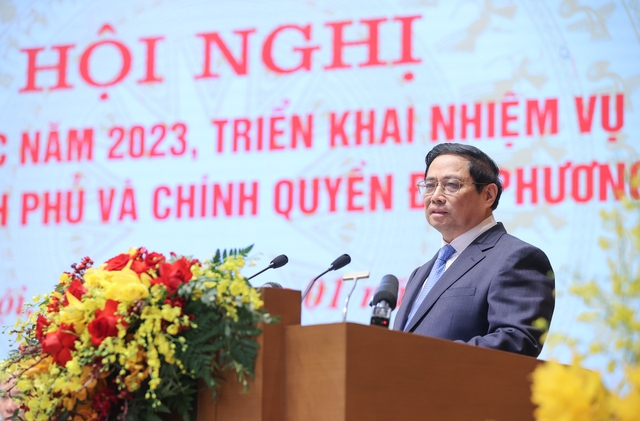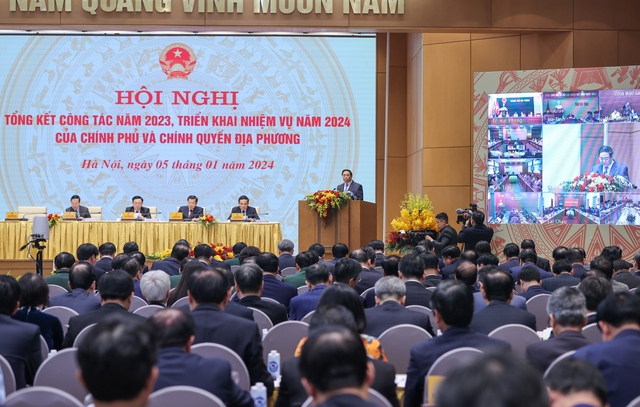Vietnam’s economy overcomes headwinds: PM
Vietnam is one of the world's fastest-growing economies, with an economic size of US$430 billion.
A strategic shift in the government’s policy management has proven instrumental in steering the economy through challenging headwinds to achieve a remarkable surge in GDP growth rates that surpass those observed in both the region and the global context.
| Prime Minister Pham Minh Chinh at the conference. Photos: Nhat Bac/VGP |
Prime Minister Pham Minh Chinh shared this view during a national conference on January 5 to discuss the government's work in 2023 and objectives for this year.
The Government leader stated that in the unpredictable global and regional dynamics of 2023, Vietnam faced a "double impact" from external unfavorable factors and internal constraints. However, thanks to the government's proactive approach of "turning the situation around", the economy has successfully "weathered the headwinds."
Over the past year, economic performance has improved every quarter, with GDP growth for 2023 reaching a notable increase of 5.05%.
At the conference, Deputy Prime Minister Le Minh Khai highlighted that Vietnam stands among the world's high-growth nations, with the size of the economy increasing to US$430 billion, while the average consumer price index rose by 3.25%, below the targeted 4.5%.
Interest rates fell by around 2% from the end of 2022, and agriculture emerged as a resilient pillar, experiencing a 3.83% growth – the highest in a decade.
Budget revenues exceeded the estimated figure by approximately 8.12%, reaching over VND1,750 trillion ($71.78 billion), even with tax exemptions, reductions, and lease deferrals totaling VND194 trillion ($7.95 billion).
The total import-export turnover reached US$683 billion, with a trade surplus of $28 billion, marking a historic high and contributing significantly to the national reserves.
Disbursement of public investment is expected to reach nearly VND676 trillion ($27.7 billion), equivalent to 95% of the Prime Minister's plan. This figure is about VND146 trillion ($6 billion), higher than 2022, the highest disbursement.
Another highlight was attracting foreign direct investment, with foreign capital inflows increasing by over 32% to nearly $37 billion.
Khai, however, noted Vietnam's economy still exhibits some limitations and challenges. Although achieving high economic growth in the region and globally, it falls short of the set target of 6.5%.
He attributed this to a decline in aggregate demand, disruptions in supply chains, and tight monetary policies in major traditional markets for Vietnam.
While basic electricity production and supply met demand, localized power outages in May- June 2023 were mainly due to passive and cumbersome issues in regulation, transmission, and distribution.
"Production and business operations faced a range of difficulties, with many enterprises facing a common challenge of reduced domestic and international demand," he added.
| Overview of the conference. |
Access to credit remains an issue, with credit growth by the end of 2023 at 13.71% compared to the target range of 14-15%, equivalent to VND13,500 trillion ($553.7 billion). Deposit balances from the population reached over VND14,500 trillion ($594.7 billion), increasing by 13.16%. However, non-performing loans are rising, with the domestic bad debt ratio at 3.36%, exceeding the targeted control threshold by the end of 2025.
Khai stated that handling weak credit institutions and addressing backlogged projects because of the need to carry out numerous procedures and assessments, including accurate valuation of asset values accumulated over several years.
While the real estate market has improved, lingering challenges, particularly in segmentation and legal complications, contribute to a subdued market. The corporate bond market is undergoing resolution but still poses potential risks, he noted.
In this regard, Prime Minister Pham Minh Chinh expressed concerns that despite some positive indicators, various ministries, sectors, and localities have not fully capitalized on these opportunities for socio-economic development. He emphasized the need to analyze results in public investment, foreign direct investment attraction, budget revenue, industrial production, and agriculture to address weaknesses effectively.
Deputy Prime Minister Le Minh Khai mentioned that this year presents a mix of favorable conditions, opportunities, and challenges, with difficulties outweighing the advantages.
Concluding the meeting, Prime Minister Pham Minh Chinh stated that the Government's priority is to promote economic growth with an expansion rate of around 6-6.5%, maintain macroeconomic stability, and control inflation within the range of 4-4.5%. Exports are expected to increase by at least 6% compared to 2023, reaching nearly $724 billion.
The Prime Minister urged ministries, sectors, and localities to remove obstacles and boost production and business to enhance the economy's absorptive capacity. He emphasized the need to address long-standing policy and organizational issues and respond quickly to unforeseen new developments.
He also called for reducing administrative procedures to cut compliance costs by 10%. The budget must increase revenue and reduce expenditure. "We are determined to cut spending by 5% and ensure that the State budget in 2024 grows by at least 5%," concluded the Prime Minister.
Experts also predict that inflationary pressures this year will not be significant, with scenarios revolving around 3.2-3.9% - lower than the National Assembly's target (4.5%).
In addition to traditional growth drivers (investment, exports, consumption), the Government is expected to focus on new drivers such as science and technology, innovation, digital transformation, green transition, and emerging areas like semiconductor chips and hydrogen. Simultaneously, there will be an accelerated disbursement of public investment, especially in key transportation projects, notably the Long Thanh Airport.














